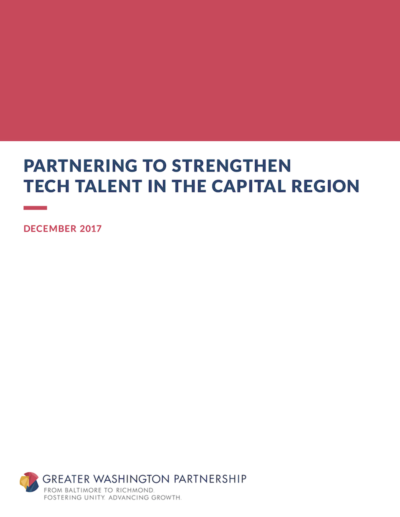Strengthening Tech Talent in the Capital Region
Publish Date: December 2017

 Download Report »
Download Report »
Developing and employing workers who are skilled in digital technology in its various forms is our region’s largest economic opportunity
Our region’s people are its greatest asset. Ensuring that people in our region can access and acquire the skills that employers need, and that we retain those skilled workers, is an essential component of our economic competitiveness. For our region, that must start with the digital technology skills that power a broad array of our region’s employers and industries, including areas of potential advantage that can fuel the Capital Region’s future growth.
Today, digital technology is increasingly integrated into everything. It is remaking industries, our economy and how people work. Building on our region’s strengths to grow the next generation of digital technology products and services will be essential to reorienting the Capital Region from its slow-growth trajectory to the high-growth performance we need to maintain and broaden prosperity. Developing and employing the workers who are skilled in digital technology in its various forms is our region’s largest economic opportunity.
The Capital Region is already home to a deep and diverse “digital tech” workforce. Our region has the third largest number of digital tech workers in the nation, and the second largest number on a per capita basis. One in every sixteen jobs in our region is in a digital tech occupation.We also boast a robust pipeline for digital tech talent, with more than 100 higher education institutions across our region, producing the largest number of digital tech- oriented degrees and certificates of any region in the U.S.
However, our region is losing share of these important digital tech jobs. Over the last five years, the number of digital tech workers in the Capital Region has increased just three percent – or 8,000 net jobs – a pace far slower than the 12 percent national growth rate.ii As job transformation and creation increasingly favor digital tech occupations, there is intense competition from other regions for these desirable jobs and workers.
Today, despite a deep digital tech workforce, the gap between supply and demand for digital tech workers in our region is larger than peer regions’ and the U.S. average, translating into 35,000 current unfilled digital tech jobs. And moving forward, without action, this potential constraint on our region will only grow. A survey of the organizations comprising the Greater Washington Partnership underscores the need, showing that that these organizations alone will need to hire more than 20,000 digital tech workers – spanning all levels of skills and experience – over the next five years to fill open jobs through growth or attrition that are vital to their organizations’ success. A broader evaluation of our region’s employers will surely show similar demand signals.
The Capital Region has unique assets that position us to be highly competitive in digital tech. And nowhere in our region are the opportunity and challenges of creating a digital tech workforce more apparent than in the cybersecurity field. As this report spotlights, cybersecurity – a digitally-intensive field where our region can be the global leader – illustrates the unique potential for our region to become a world-class digital technology hub, developing adjacent high growth fields such as artificial intelligence, data analytics and software development.
By looking more closely at the composition of our region’s cybersecurity industry, we can also learn how to deliver a digital tech workforce for the region. Key challenges that we must address include: expanding the pipeline of students interested and proficient in STEM; aligning the skills and experience that employers need with what our educational institutions and workforce training systems provide; and improving retention of our graduates and existing employees.
To meet the demand for these skilled workers, employers must partner with academia, workforce and government leaders to adapt and expand our region’s talent pipeline, from the earliest grades through college, career training and beyond. Thismeansclosercollaborationbetweeneducators and industry to tighten the feedback loop between academic and applied learning, and positioning our learning institutions and workforce systems to have the flexibility to rapidly adapt with the needs of employers and advances in technology.
Across our region there are many promising and innovative approaches that are working to address the digital tech talent needs of employers.In addition to identifying the challenges and root causes underpinning our region’s current gap for cybersecurity professionals, this report is intended to highlight some examples of how the organizations comprising the Greater Washington Partnership are taking action. These models range from introducing K-12 students to possible career paths, working with higher education institutions to increase the number of people entering the workforce with in-demand credentials and certifications, to developing and recruiting a more diverse workforce. All of these signify the types of programs we can learn from and scale to meet our region’s need for digital tech talent.
We are reminded by recent announcements of well-known companies looking to relocate or expand that it is a global competition for talent and that strong pipelines for talent matter – particularly digital tech talent. The Capital Region’s unique attributes as the cross-roads of research and development, policy, business, media and national security, anchored by the U.S. federal government, position us to lead the nation’s digital transformation and provide compelling reasons for the most talented and ambitious to be part of our desirable communities. TheGreaterWashingtonPartnership is committed to helping our region capitalize on these attributes – finding and scaling innovative ways that employers, educators and government can partner to advance the Capital Region’s position as home to the best, deepest and most capable workforce in the world, starting with digital tech.